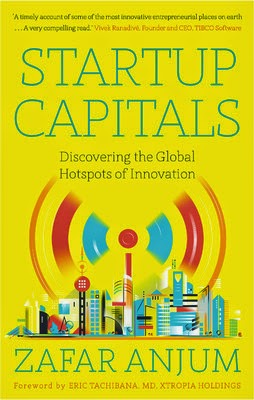Startup Capitals : Discovering the Global Hotspots of Innovation (English)
Product Details
Hardcover: 320 pages
Publisher: Random House India (31 December 2014)
Language: English
ISBN-10: 8184005946
ISBN-13: 978-8184005943
Product Dimensions: 22.4 x 14 cm
As the Internet has matured in technology and reach, we have seen an explosion in tech startups all over the world. Not only are some of these startups changing the world and how we live in it, they are also proving to be the engines of job creation – an aspect that will be critical in the future. To support these startups, new ecosystems are popping up all over the globe to help grow these companies, aided by governments, successful entrepreneurs and venture capitalists.
In Startup Capitals, Zafar Anjum brings you a ringside view from the worlds top ten startup cities of the world. Well-researched and highly insightful, this book lays bare the engines of innovation and the lessons that can be learnt from these burgeoning startup capitals.
Advance praise
About the Author
Zafar Anjum is a Singapore-based journalist, writer and filmmaker. He currently works as the Asia Online Editor of Computerworld Singapore, CIO Asia and MIS Asia. His most recent works include Iqbal: The Life of a Poet, Philosopher and Politician (2014), The Resurgence of Satyam (2012) and The Singapore Decalogue – Episodes in the Life of a Foreign Talent (2012). He edits a literary website, Kitaab.org.
Pre-order the book at Amazon and Flipkart now.
Product Details
Hardcover: 320 pages
Publisher: Random House India (31 December 2014)
Language: English
ISBN-10: 8184005946
ISBN-13: 978-8184005943
Product Dimensions: 22.4 x 14 cm
As the Internet has matured in technology and reach, we have seen an explosion in tech startups all over the world. Not only are some of these startups changing the world and how we live in it, they are also proving to be the engines of job creation – an aspect that will be critical in the future. To support these startups, new ecosystems are popping up all over the globe to help grow these companies, aided by governments, successful entrepreneurs and venture capitalists.
In Startup Capitals, Zafar Anjum brings you a ringside view from the worlds top ten startup cities of the world. Well-researched and highly insightful, this book lays bare the engines of innovation and the lessons that can be learnt from these burgeoning startup capitals.
Advance praise
- "As we enter a new phase in human history – a phrase Ive referred to as Civilization 3.0-creativity and entrepreneurial spirit are achieving new milestones for humanity. How and where this creativity is flourishing today is the subject of Anjums book. It is a timely account of some of the most innovative entrepreneurial places on earth and should prove to be a very compelling read." – Vivek Ranadive, Founder and CEO, TIBCO Software, Inc. Owner, Sacramento Kings
- "Startup Capitals takes us on an enthralling and stimulating tour of some of the most innovative cities on the globe. It is a timely and illuminating account of people and places that are shaping the human future." – Virender Aggarwal, CEO, Ramco Systems
- "Creativity and invention do not occur in isolation. Environment and community fuel it. Mr. Anjum gives us a journey through those landscapes where the future is being created and inspires us to join those cities of innovation that define our time." – Matthew Putman PhD, CEO, Nanotronics Imaging, New York
- "Silicon Valley is more than the sum of its parts. And as the world looks at the ‘sum’, this new book zooms in on the parts-the history, events, people and unique occurrences that add up to make the Valley what it is. As a tech strategist and business partner with more than 30 years of experience with Silicon Valley, I value the insight and specific recommendations Zafar Anjum has gathered in this important book." – Barbara Bates, Founder and CEO, Eastwick, Silicon Valley
- "Many of the world want to emulate Silicon Valley, yet few have brought context to the incredible story thats taken shape here. Looking deeply at the Valleys history and how our unique ecosystem took shape, Zafar Anjum offers new perspectives that global innovators can use as they envision the communities-and the companies-that build economic success." – Ellen Petry Leanse, Tech Pioneer and Advisor, San Francisco
- "Zafar does a brilliant job identifying the key factors that make a city a startup city. – Daniel T. Cohen, Cybersecurity Professional and Strategist at RSA, The Security Division of EMC, Israel
- Where will be the next centre of innovation? What are the ingredients for a successful startup ecosystem? These are significant questions for which the jury is still out. Through this book, Zafar Anjum offers insights into the intriguing and exciting world of startups that are shaping our future." – Manish Goel, co-founder and CEO, TrustSphere, New York
- "Over the years, Zafar has created a highly respected body of work in journalism. He tackles his subject matter with the tenacity and thoroughness of a good investigative reporter. His previous books have not only been great pieces of journalistic work but also, most importantly, good reads. Startup Capitals promises to be an informative and engrossing piece of work which will add to the understanding of why some cities are more successful than others in nurturing innovation and a risk-taking culture." – Amit Roy Choudhury, Technology Editor, The Business Times (Singapore)
About the Author
Zafar Anjum is a Singapore-based journalist, writer and filmmaker. He currently works as the Asia Online Editor of Computerworld Singapore, CIO Asia and MIS Asia. His most recent works include Iqbal: The Life of a Poet, Philosopher and Politician (2014), The Resurgence of Satyam (2012) and The Singapore Decalogue – Episodes in the Life of a Foreign Talent (2012). He edits a literary website, Kitaab.org.
Pre-order the book at Amazon and Flipkart now.


